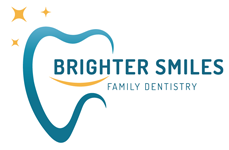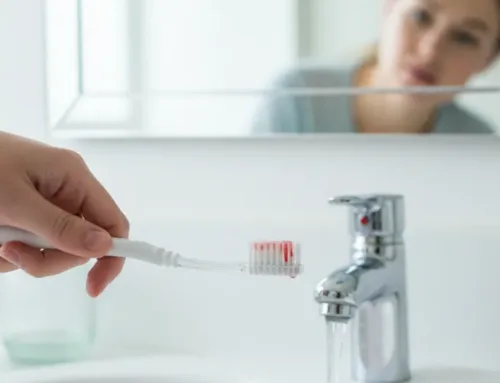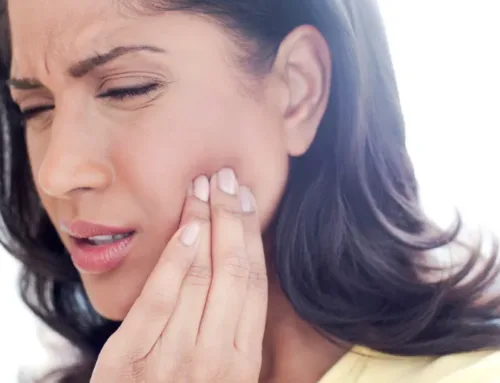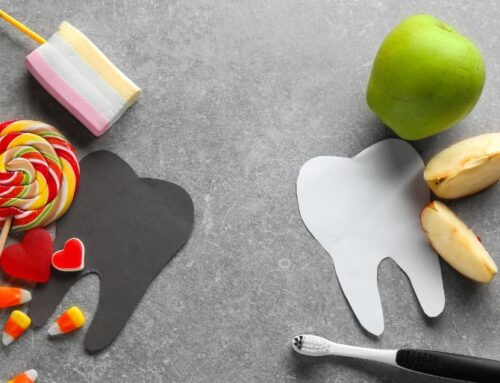
Understanding how to deal with dental anxiety is crucial, as this fear or stress associated with dental settings can lead to delaying or avoiding necessary dental treatments, which can negatively impact oral health.
Triggers for dental anxiety include the sight of needles, the sound of drills, or the overall dental environment.
When this anxiety becomes severe and irrational, leading to a consistent avoidance of dental visits, it may be classified as dental phobia.
Mental health conditions such as generalized anxiety disorder, post-traumatic stress disorder (PTSD), and a history of head and neck trauma can heighten the risk of experiencing dental anxiety.
Additionally, conditions like depression, bipolar disorder, and schizophrenia can also contribute to higher anxiety levels.
Table of Contents:
Strategies to Manage Dental Anxiety
Managing dental anxiety effectively requires a combination of communication, relaxation techniques, and mental exercises. Here are some practical strategies that can help you feel more at ease during your dental visits:
Strategy #1. Communicate Your Concerns to Your Dentist
One of the most effective ways to manage dental anxiety is to openly communicate your concerns with your dentist. Sharing your fears can help your dentist understand your needs and tailor their approach to make you feel more comfortable. Here’s how to start the conversation:
- 1
Be Honest: Explain your anxiety and specific fears, such as a fear of needles or the sound of drills. Your dentist can then provide detailed explanations about procedures and offer reassurance.
- 2
Ask Questions: Understanding what to expect during your appointment can alleviate fears. Don’t hesitate to ask your dentist to explain procedures step-by-step.
- 3
Discuss Options: Many dentists offer anxiety-reducing options like sedation or the use of a numbing gel before injections. Discuss these options to find what works best for you.
- 4
Create a Signal: Agree on a hand signal you can use if you need a break during a procedure. This gives you a sense of control and can reduce anxiety.
Strategy #2. Breathing Exercises and Relaxation Techniques
Breathing exercises and relaxation techniques can be highly effective in easing anxiety, making dental visits more tolerable. Here are some approaches you can try:
- 1
4-7-8 Breathing: Start by breathing in through your nose for four counts, then hold your breath for seven counts, and finally exhale through your mouth for eight counts. This method can quickly help induce a state of relaxation.
- 2
Mental Imagery: Close your eyes and visualize yourself in a serene environment, such as a quiet beach or a peaceful forest. This mental exercise can shift your focus away from the dental procedure, fostering tranquility.
- 3
Controlled Breathing: Slowly draw air through your nose, hold it briefly, and then exhale gently through your mouth. Repeating this process can significantly alleviate tension and anxiety.
- 4
Muscle Relaxation Sequence: Begin with your toes and progress upwards, tensing and then relaxing each muscle group. This technique helps in reducing physical stress and promoting a relaxed state.
Strategy #3. Meditation and Muscle Relaxation
Meditation and muscle relaxation exercises can also play a crucial role in managing dental anxiety. These techniques help you focus your mind and release physical tension, making dental visits less stressful.
- 1
Guided Meditation: Use a meditation app or recording to help you relax before and during your dental appointment. These sessions guide you in focusing on your breathing and achieving a calm state of mind.
- 2
Mindfulness Meditation: Practice mindfulness by concentrating on the present moment. Notice your breathing, the sensations in your body, and the sounds around you. This focus can help distract you from anxious thoughts related to the dental procedure.
- 3
Body Scan Meditation: This method involves paying attention to different parts of your body and releasing any tension you find. Begin at your toes and gradually move up to your head, consciously relaxing each muscle group.
- 4
Yoga and Stretching: Add gentle yoga poses and stretches to your routine to help reduce overall anxiety and physical tension. Poses such as child’s pose and forward bends can be especially soothing.
Strategy #4. Guided Imagery and Hypnosis
Guided imagery and hypnosis are effective methods to manage dental anxiety by shifting your mental focus and promoting relaxation.
- 1
Guided Imagery: Before your appointment, take some time to close your eyes and picture yourself in a serene and peaceful place, like a quiet beach or a forest. Concentrate on the details of this scene—the sounds, the smells, and the sights. This mental exercise can help take your mind off the upcoming dental procedure and reduce anxiety.
- 2
Hypnosis: Hypnosis involves entering a deeply relaxed state where you are more open to suggestions. This can be done with the help of a trained hypnotherapist or by using self-hypnosis techniques. Listening to a hypnosis recording specifically designed for dental anxiety can help calm your mind before and during your appointment.
Strategy #5. Distraction Techniques
Distraction techniques can be very effective in reducing dental anxiety by keeping your mind occupied with something other than the procedure.
- 1
Music or Audiobooks: Bring headphones and listen to your favorite music, an interesting audiobook, or a podcast. Engaging your mind in something enjoyable can distract you from the sounds and sensations of dental work.
- 2
Videos or TV Shows: If your dental office has screens, watching a video or TV show can help keep your mind off the procedure. The visual and auditory distraction can make the time pass more quickly and reduce anxiety.
- 3
Stress Relief Tools: Holding a stress ball, a fidget spinner, or any small object can help occupy your hands and focus your energy, which can be particularly soothing if you tend to fidget when nervous.
Strategy #6. Bring a Friend for Support
Bringing a friend or family member to your dental appointment can greatly help in reducing anxiety and providing emotional comfort.
- 1
Emotional Comfort: Having someone you trust by your side can provide reassurance and help calm your nerves. Their presence can make you feel more at ease before, during, and after your dental visit.
- 2
Engagement and Distraction: Engaging in light conversation with your companion while waiting can help divert your mind from any worries about the procedure. During the appointment, their presence can be a comforting distraction.
- 3
Communication Aid: If you find it challenging to express your concerns or needs to the dental staff due to anxiety, your friend can assist by communicating on your behalf. They can also help with any aftercare instructions and ensure you get home safely.
Causes of Dental Anxiety
Knowing what triggers dental anxiety can help in devising effective strategies to cope with it. Here are some common and not-so-well-known reasons:
Understanding these signs and causes can help you develop strategies to manage dental anxiety effectively. By recognizing your triggers and addressing them proactively, you can make your dental visits much more manageable and less stressful.
Impact of Dental Anxiety on Oral Health
Dental anxiety can profoundly impact oral health, leading to a variety of complications. Understanding these effects can motivate you to address anxiety and improve your dental care.
How Dental Anxiety Affects Oral Health
Anxiety that leads to skipping dental appointments can turn small dental issues into significant problems. For instance, an untreated cavity might develop into a painful infection or necessitate complex treatments like root canal therapy.
Additionally, anxiety can result in neglected oral hygiene routines, such as irregular brushing and flossing, which heightens the risk of plaque accumulation, periodontal disease, and tooth decay.
Moreover, dental anxiety can result in stress-related behaviors like grinding your teeth (bruxism). This habit can wear down the enamel, cause tooth fractures, and contribute to jaw pain and temporomandibular joint (TMJ) disorders.
Who Can Be Affected by Dental Anxiety
Dental anxiety is not limited to a specific age group or demographic; it can affect anyone, from children to older adults. However, certain groups might be more susceptible:
Understanding who is affected by dental anxiety and how it impacts oral health can guide you in seeking appropriate help and taking steps to manage your anxiety. By addressing these issues, you can improve both your dental health and overall well-being.
Medical Treatments for Dental Anxiety
There are several medical treatments designed to alleviate dental anxiety, ensuring comfort and ease during dental visits. Familiarizing yourself with these options can help you choose the best approach for your needs.
Relative Analgesia (Happy Gas)
Relative analgesia, often referred to as happy gas, is a technique used to help patients relax during dental procedures. This involves inhaling a combination of nitrous oxide and oxygen through a nasal mask. It is a favored option due to its safety, rapid effectiveness, and quick recovery time.
Anxiety-Relieving Medication (Oral Anxiolytic Tablets)
Oral anxiolytic tablets are prescribed to help reduce anxiety before dental appointments. These medications are usually taken shortly before the visit, under the guidance of your dentist or doctor.
Conscious Sedation
Conscious sedation is a technique that uses sedative medications to help patients stay relaxed during dental procedures while remaining awake and responsive. This approach is typically employed for more complicated or extended treatments.
General Anesthesia
General anesthesia is employed to induce complete unconsciousness during dental treatments. It is typically used for major procedures or for those with intense dental fears or specific needs.
By learning about these options for treating dental anxiety, you can choose the most suitable method to make your dental visits more comfortable and stress-free. It is important to talk with your dentist about your concerns and provide a full medical history to determine the best treatment plan for you.
Additional Tips for Reducing Dental Anxiety
Beyond medical treatments and basic relaxation techniques, there are additional strategies that can help manage and reduce dental anxiety effectively.
Ways to Reduce Stress and Anxiety
Utilizing these strategies can result in a more pleasant dental experience, making it simpler to maintain your oral health without the burden of anxiety.
Find Comfort and Confidence in Your Dental Care
Addressing dental anxiety is a noteworthy accomplishment. Each small step you take towards alleviating anxiety enhances your oral health and overall wellness. At Brighter Smiles, we are committed to creating a relaxing and supportive atmosphere for all our patients.
Next Steps:
- 1
Schedule a Consultation: Arrange a meeting with Brighter Smiles to discuss your concerns and find the best ways to manage your dental anxiety.
- 2
Tailored Care: Our team is committed to offering care customized to your needs, ensuring a stress-free and positive experience.
- 3
Resources and Support: Visit our website for additional information, helpful resources, and tips on handling dental anxiety.
Don’t let anxiety hinder you from achieving a healthy, radiant smile. Reach out to Brighter Smiles today and take the first step towards a more relaxed and confident dental visit.

About the Author
Brighter Smiles Family Dentistry, led by Dr. Melani Fulton, upholds a legacy of exceptional dental care in West Des Moines, IA. Dr. Fulton, a University of Iowa College of Dentistry alumna, specializes in family dentistry and orthodontics. She succeeded Dr. Dan Todd in 2021, continuing a tradition of patient-centered, high-quality dentistry. Committed to gentle, modern treatments, Dr. Fulton’s approach is deeply rooted in community values, ensuring every patient feels like family at Brighter Smiles.




